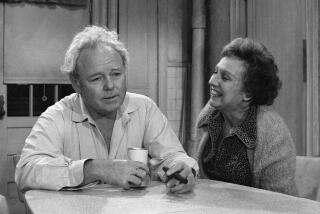TV REVIEWS : ‘Marshall’: The Good in Government
- Share via
The demonizing of government by politicians of the World War II era never made much sense, because they could never explain how Hitler could have been defeated and a devastated Europe rebuilt without massive government intervention. More specifically, they had to confront the figure of George C. Marshall, architect of both the U.S. military machine in World War II and the Marshall Plan, and driven by the now-abstract passion of service to country.
If government was so evil, how could it have produced someone so clearly motivated to do good as Marshall?
Indeed, the figure that emerges in the 90-minute “George Marshall and the American Century” (at 9 tonight on KCET-TV Channel 28; 8 p.m. on KPBS-TV Channel 15) is almost too good to be true. The worst that can be said for the Marshall portrayed by writer Geoffrey C. Ward in this Kenneth Mandel-Daniel B. Polin production is that he was a lousy student and, later, a tad impatient and insistent on one-page memos.
Worse could be said of one’s grandmother. Marshall is seen as a man of extraordinary loyalty, willing to take any military assignment handed him, and so deferential that he is shown stepping back from the path of photographers as if to make himself invisible.
He also knew, like a good soldier, when to draw a line in the sand. Clark Clifford, seemingly pleased that he can talk about something other than his current woes with the BCCI scandal, recalls how then-Secretary of State Marshall rebuked Clifford’s support for a fast-track policy to establish a Jewish state by saying to President Harry S. Truman that if such a policy were implemented, Marshall couldn’t vote for Truman in the next election.
Truman, though, depended on Marshall’s steadying hand just as much as Franklin D. Roosevelt did during the rapid build-up of the U.S. armed forces at the start of World War II. Marshall’s seeming modesty hid a grand vision of grand projects, which began in World War I when he orchestrated the secret network of supply lines that turned the tide against the Germans. Then, with the global reach of his successful military strategies during World War II, and the subsequent aid to Europe as a masterstroke of governmental goodness, Marshall’s vision surpassed perhaps his own privately held expectations.
Despite liberal use of taped recordings of Marshall by his official biographer, Forrest Pogue, and a bevy of accounts by family and colleagues, this portrait of Marshall is incomplete. Surely more than love of military school pushed this poor pupil to the level of world figure. And Marshall’s policies were hardly purely altruistic: He had campaigned in the 1920s for a permanent, unsurpassed military force to advance U.S. global influence, and everything he did from that point on had that goal in mind. Some call that imperialism; perhaps George Marshall was a Roman with a human face.
More to Read
The complete guide to home viewing
Get Screen Gab for everything about the TV shows and streaming movies everyone’s talking about.
You may occasionally receive promotional content from the Los Angeles Times.






